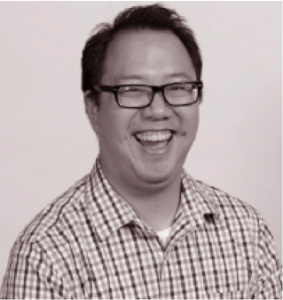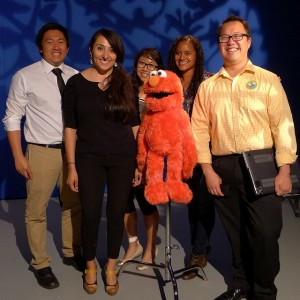 Jason Yip was a Research Fellow here at the Joan Ganz Cooney Center in 2013-14. He is currently a Senior Fellow here as well as an assistant professor at the University of Washington. We asked him to share some highlights from his time here, as well as what he is doing now.
Jason Yip was a Research Fellow here at the Joan Ganz Cooney Center in 2013-14. He is currently a Senior Fellow here as well as an assistant professor at the University of Washington. We asked him to share some highlights from his time here, as well as what he is doing now.
Tell us a little bit about some of the activities you worked on while you were a Cooney Center Fellow.
Sure, some of the highlights of my time here at the Cooney Center were:
- Running around New York City with video equipment to capture the lives of Latino families and their use of technology and media for learning.
- Helping to organize major events, such as meetings for the Families and Media Project consortium and the Learning at Home report release.
- Trying my own Cooney Center Fellows project in which Vikki Katz, Carmen Gonzalez, and I studied how Latino youth search and broker online information for their English-language-learning parents.
- Writing a book chapter with Michael Levine, Ellen Wartella, and Alexia Lauricella on early childhood and digital technologies.

Photo by Lori Takeuchi
What was the best part of being at the Cooney Center?
My favorite part of being a Cooney Center Fellow was just taking time to learn about how to study families engaged in learning with technology. I had just finished a dissertation examining how children develop ownership in science learning in after school settings. I came to realized in my analysis that in order to fulfill the mission of connected learning, I needed to better understand the space of families and learning. At the Cooney Center, I felt I could spend an entire year thinking deeply about how my research in designing new technologies could connect together in the family space. It was truly an opportunity to reflect and converse with many experts (academic, industry, non-profit) in the field of families, technologies, and learning.
Can you share a little bit about what you’ve been up to since your fellowship ended?
Since I have left, I have become an assistant professor of digital youth at the University of Washington. I just made it through my first official year here. From my Cooney Center experience, I’ve been able to craft and explore the following research question here: “How do families and children collaborate and participate together in learning, and what role does technology play in these interactions?” To answer this question, I’ve been working on my NSF Cyberlearning project, exploring how mobile social media and large public tangible displays help to connect STEM learning in neighborhoods across school, after school, and family settings. I’ve also started KidsTeam UW, an intergenerational design team composed of children (ages 7–11) and adult researchers focusing on co-designing new technologies and learning activities for children. KidsTeam UW has worked closely together with the Seattle Public Library to create new learning activities for families and technologies, develop a new game development tool (BlockStudio) that helps families engage in programming together without textual-code, and working with Foundry10 (a non-profit) to see how Super Mario Maker can be implemented into libraries to teach design thinking for families.
Tell us a little more about what you are working on as a Senior Fellow.
As I mentioned before, my fellowship project focused on studying how Latino children (ages 11–14) search, translate, and broker online information for their English language learning families. We did an exploratory study and interviewed 10 Latino children and had them engage in information search tasks to understand how they search and translate online information and what skills they were learning. Vikki, Carmen, and I were able to publish our findings from this study in the International Conference of the Learning Sciences. As a Senior Fellow, I’ve been able to also take our exploratory research to present it to Google. Carmen and I were able to win a Google Faculty Research Award on this work, in which we will be able to present findings that will help Google build better search capabilities for English language learners and lower literacy populations. We’ll be exploring deeper this search-and-brokering phenomenon with about 30 Latino English-language-learning families, and going into their homes to conduct interviews and search tasks. Carmen and I are both really interested in seeing how mobile technology plays a part in this search, what aspects of health information are families accessing, and how differences occur in age, gender, and birth order. We’re hoping to present our work to show the kinds of struggles English-language-learning families and children face in searching for online information, the important skill sets children use, and what kinds of important learning occurs when children and families search the Internet together.
What role would you say the fellowship has played in your professional trajectory?
The fellowship made a huge impact on my professional trajectory. Before I came to the Cooney Center, it was pretty difficult to say what exactly my research trajectory was. I did a number of Internet search studies, wrote a lot of papers on co-designing new technologies with children, and examining STEM learning and identity develop in informal settings. Being at the Cooney Center helped me to see that all the past research I was doing could be applied to families, technologies, and learning. In particular, working with Lori, Vikki, and Carmen helped me understand the need to understanding Latino families, particularly as this group becomes more integrated with technology. With the Internet search studies, I’ve been able to learn more about how English-language-learning families search the Internet together. With co-design, we are focusing more on how families co-design together. More recently, I just got a paper published at SIGCHI, examining how families play a role in co-design. Finally, it was at the Cooney Center that I wrote up the NSF Cyberlearning grant about how we needed to study neighborhood science learning through the lens of family participation. So yes, I would say the Joan Ganz Cooney Center has been hugely influential on my research path.
What tips would you share with a prospective applicant about the Cooney Center Fellowship?
I would say this is the best fellowship out there when it comes to family learning, technology, and new media. In your applications, focus on how a Cooney Center fellowship could direct your research path into this area. Also, be willing to share your idea for your fellows project and be serious about finding a way to complete it realistically within a one-year framework.
The deadline to apply for the 2016-17 fellowship is April 4, 2016.

